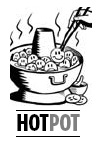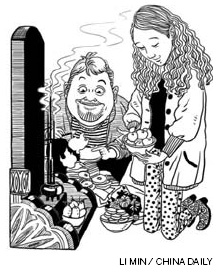Getting close with wife's ancestors
By STUART BEATON ( China Daily ) Updated: 2010-04-13 10:36:04
The cold wind blew clouds of ashes around the mounds, and we shivered and drew our coats closer.

It was Qingming Festival, the Tomb Sweeping Day, and I'd been invited to go with my wife's family to help tend to her family's graves. Not the sort of offer I'd had before, so I was keen to take the opportunity to go out into the countryside, to see what life outside of suburban Tianjin was like.
The day started early - very early. I was prodded awake at 6 o'clock, a time I don't often see, and gently herded downstairs and into Ellen's father's car. I dozed off and on in the back seat, as he drove us for almost 90 minutes outside of the city. About halfway along, we stopped to buy apples and Chinese white wine (baijou) at a small road-side stall.
As the larger sealed roads gave way to small dirt tracks, I began to notice conical mounds in the fields, topped with a large rock or clod of dirt. I didn't pay them much mind, thinking those were probably well markers, or something agricultural in nature.
Eventually we stopped at a field that seemed to have an awful lot of these mounds on it. It was then that it dawned on me that they were burial sites, and the reason why we were there.
In an extremely surreal moment, I was handed a shovel by Ellen's father. Terrible horror movie clichs spun through my head, and I had a sudden vision of having to reprise the work of Burke and Hare. I was relieved when Ellen told me it was to chip the weeds off the mounds, and nothing nastier!
Ellen's mother set out in the lead, looking for her ancestor's tombs. After a few wrong turns, and a bit of back tracking, we found them, and set to work clearing away the weeds and rubbish that had gathered on their sides. It was my job to skim the surface of the mound with the shovel, and smooth it off.
After we'd made the graves neat and tidy, I helped Ellen's father to start a small fire, into which Ellen's family added sheets of paper that had holes punched in it. I asked Ellen what they were doing, and she told me that they were sheets of coins, and by burning them, they were sending them to their ancestors - to make them comfortable in the afterlife.

At nearby mounds, other families were burning more elaborate paper objects. I saw model cars and a boat go up in flames - even a small mahjong set.
As the offerings we had brought burned, Ellen's mother talked slowly and carefully to the mounds.
"What's she saying, Ellen?"
"She's telling her parents all about you - what a good man you are, how we're getting married, everything."
"I hope she's telling them only the good things ..."
We lit a bundle of incense sticks, and carefully placed them before the grave. Next to them, we placed the apples, and Ellen's father poured the baijou over the mound.
Finally, I laid out a string of firecrackers, and lit them. As they burst and popped, we bowed three times to Ellen's ancestors. The wind swirled the red paper around my ankles, and carried it off across the fields surrounding us.
I shouldered the shovel, and took Ellen's hand for the walk back to the car, happy in the feeling that I was now a part of a family tradition - that I was becoming more and more a part of my new, Chinese family, and of their lives.
|
|
|
|
|
|
|
|


























 Raymond Zhou:
Raymond Zhou: Pauline D Loh:
Pauline D Loh: Hot Pot
Hot Pot Eco China
Eco China China Dream
China Dream China Face
China Face






